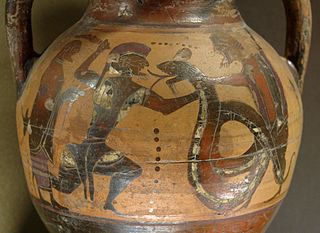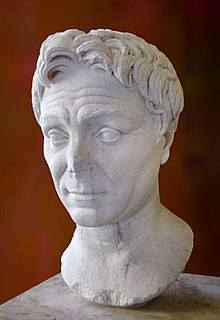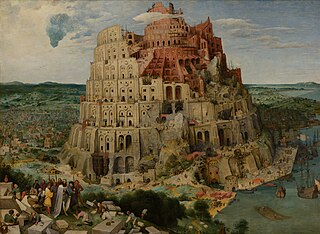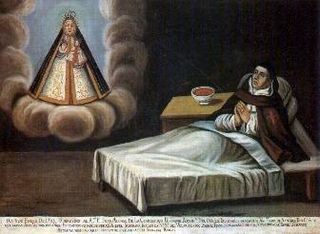
Abraham, originally Abram, is the common patriarch of the three Abrahamic religions. In Judaism, he is the founding father of the Covenant, the special relationship between the Jewish people and God; in Christianity, he is the prototype of all believers, Jewish or Gentile; and in Islam he is seen as a link in the chain of prophets that begins with Adam and culminates in Muhammad.

Heracles, born Alcaeus or Alcides was a divine hero in Greek mythology, the son of Zeus and Alcmene, foster son of Amphitryon. He was a great-grandson and half-brother of Perseus. He was the greatest of the Greek heroes, a paragon of masculinity, the ancestor of royal clans who claimed to be Heracleidae (Ἡρακλεῖδαι), and a champion of the Olympian order against chthonic monsters. In Rome and the modern West, he is known as Hercules, with whom the later Roman emperors, in particular Commodus and Maximian, often identified themselves. The Romans adopted the Greek version of his life and works essentially unchanged, but added anecdotal detail of their own, some of it linking the hero with the geography of the Central Mediterranean. Details of his cult were adapted to Rome as well.

Jacob, later given the name Israel, is regarded as a Patriarch of the Israelites. According to the Book of Genesis, Jacob was the third Hebrew progenitor with whom God made a covenant. He is the son of Isaac and Rebecca, the grandson of Abraham, Sarah and Bethuel, the nephew of Ishmael, and the younger twin brother of Esau. Jacob had twelve sons and at least one daughter, by his two wives, Leah and Rachel, and by their handmaidens Bilhah and Zilpah.

Gnaeus Pompeius Magnus, usually known in English as Pompey or Pompey the Great, was a military and political leader of the late Roman Republic. He came from a wealthy Italian provincial background, and his father had been the first to establish the family among the Roman nobility. Pompey's immense success as a general while still very young enabled him to advance directly to his first consulship without meeting the normal requirements for office. His success as a military commander in Sulla's second civil war resulted in Sulla bestowing the nickname Magnus, "the Great", upon him. His Roman adversaries insulted him as adulescentulus carnifex, "the teenage butcher", after his Sicilian campaign. He was consul three times and celebrated three triumphs.

The Tower of Babel as told in Genesis 11:1–9 is an origin myth meant to explain why the world's peoples speak different languages.

Samson was the last of the judges of the ancient Israelites mentioned in the Book of Judges in the Hebrew Bible and one of the last of the leaders who "judged" Israel before the institution of the monarchy. He is sometimes considered to be an Israelite version of the popular Near Eastern folk hero also embodied by the Sumerian Enkidu and the Greek Heracles.

Dr. Hannibal Lecter is the main character in a series of suspense novels by Thomas Harris. A respected Baltimore socialite and renowned forensic psychiatrist, who moonlights as a cunning, highly-intelligent, cannibalistic and psychopathic serial-killer: the "Chesapeake Ripper", he is a central character in the novels featuring him, who is incarcerated by the authorities and consulted by the FBI to assist them in finding other similar serial-killers within the United States.

Joseph is an important figure in the Bible's Book of Genesis. Sold into slavery by his jealous brothers, he rose to become vizier, the second most powerful man in Egypt next to Pharaoh, where his presence and office caused Israel to leave Canaan and settle in Egypt. The composition of the story can be dated to the period between the 7th century BCE and the third quarter of the 5th century BCE, which is roughly the period to which scholars date the Book of Genesis.

Alvin and the Chipmunks, originally David Seville and the Chipmunks or simply the Chipmunks, are an American animated virtual band created by Ross Bagdasarian Sr. for a novelty record in 1958. The group consists of three singing animated anthropomorphic chipmunks: Alvin, the mischievous troublemaker, who quickly became the star of the group; Simon, the tall, bespectacled intellectual; and Theodore, the chubby, impressionable sweetheart. The trio is managed by their human adoptive father, David (Dave) Seville. In reality, "David Seville" was Bagdasarian's stage name, and the Chipmunks themselves are named after the executives of their original record label. The characters became a success, and the singing Chipmunks and their manager were given life in several animated cartoon productions, using redrawn, anthropomorphic chipmunks, and eventually films.

The Kingpin is a fictional supervillain appearing in American comic books published by Marvel Comics. The character was created by Stan Lee and John Romita Sr., and first appeared in The Amazing Spider-Man #50.

Vlad III, known as Vlad the Impaler or Vlad Dracula, was voivode of Wallachia three times between 1448 and his death.
Magical creatures are an aspect of the fictional wizarding world contained in the Harry Potter series by J. K. Rowling. Throughout the seven books of the series, Harry and his friends come across many of these creatures on their adventures, as well as in the Care of Magical Creatures class at Hogwarts. Rowling has also written Fantastic Beasts and Where to Find Them, a guide to the magical beasts found in the series. Many of these are derived from folklore, primarily Greek mythology, but also British and Scandinavian folklore. Many of the legends surrounding mythical creatures are also incorporated in the books. "Children ... know that I didn't invent unicorns, but I've had to explain frequently that I didn't actually invent hippogriffs," Rowling told Stephen Fry in an interview for BBC Radio 4. "When I do use a creature that I know is a mythological entity, I like to find out as much as I can about it. I might not use it, but to make it as consistent as I feel is good for my plot."

People v. Jackson was a 2004–2005 criminal trial held in Santa Barbara County Superior Court in which American singer Michael Jackson was charged with molesting Gavin Arvizo, a 13-year-old boy. Jackson was indicted for four counts of molesting a minor, four counts of intoxicating a minor to molest him, one count of attempted child molestation, one count of conspiring to hold the boy and his family captive, and conspiring to commit extortion and child abduction. He pleaded not guilty to all counts. The trial spanned approximately 18 months, from Jackson's arraignment on January 16, 2004 to June 13, 2005. The jury delivered a verdict of not guilty on all charges, including four lesser misdemeanour counts.

Inferno is the first part of Italian writer Dante Alighieri's 14th-century epic poem Divine Comedy. It is followed by Purgatorio and Paradiso. The Inferno tells the journey of Dante through Hell, guided by the ancient Roman poet Virgil. In the poem, Hell is depicted as nine concentric circles of torment located within the Earth; it is the "realm ... of those who have rejected spiritual values by yielding to bestial appetites or violence, or by perverting their human intellect to fraud or malice against their fellowmen". As an allegory, the Divine Comedy represents the journey of the soul toward God, with the Inferno describing the recognition and rejection of sin.

In Christian theology and ecclesiology, the apostles, particularly the Twelve Apostles, were the primary disciples of Jesus, the central figure in Christianity. During the life and ministry of Jesus in the 1st century AD, the apostles were his closest followers and became the primary teachers of the gospel message of Jesus.
















